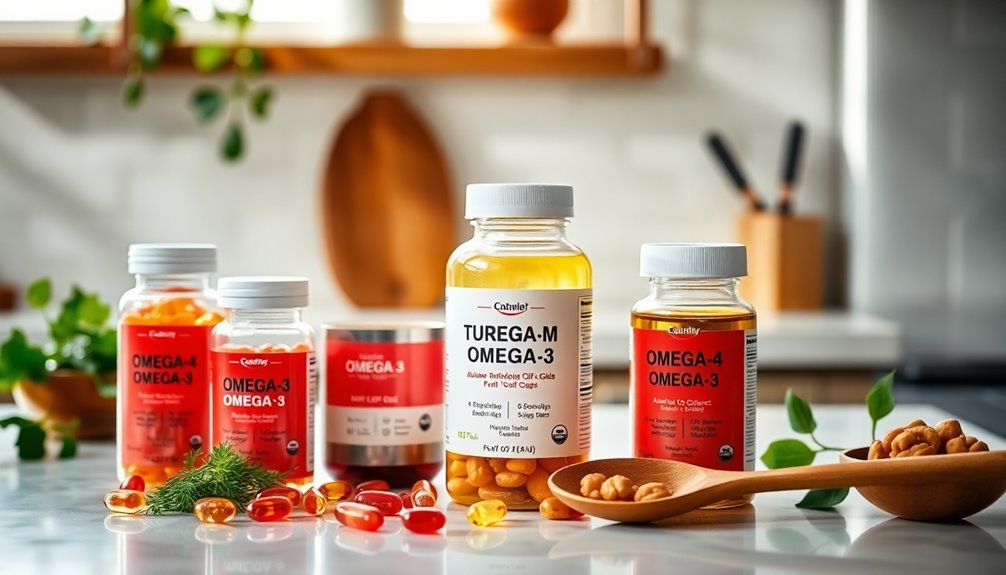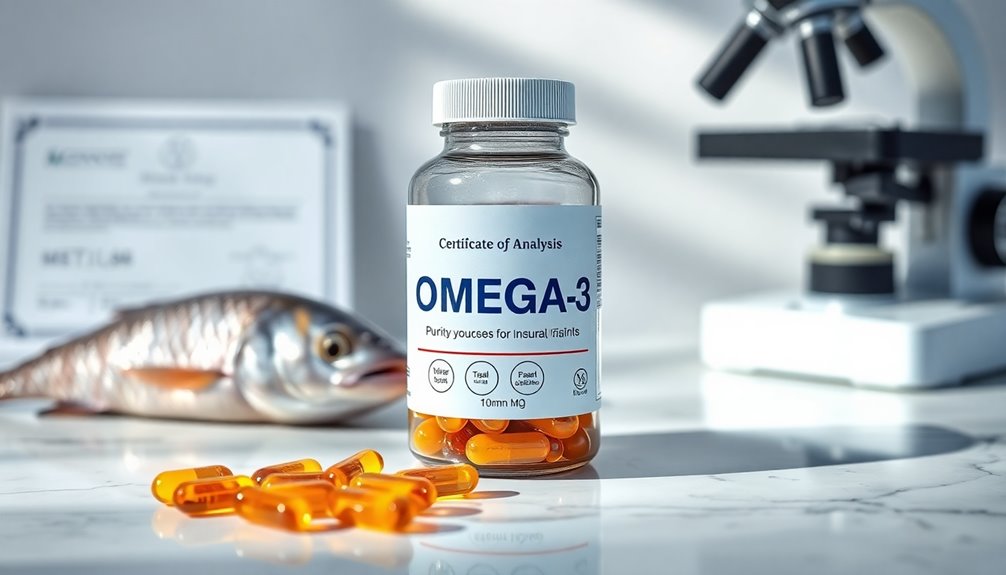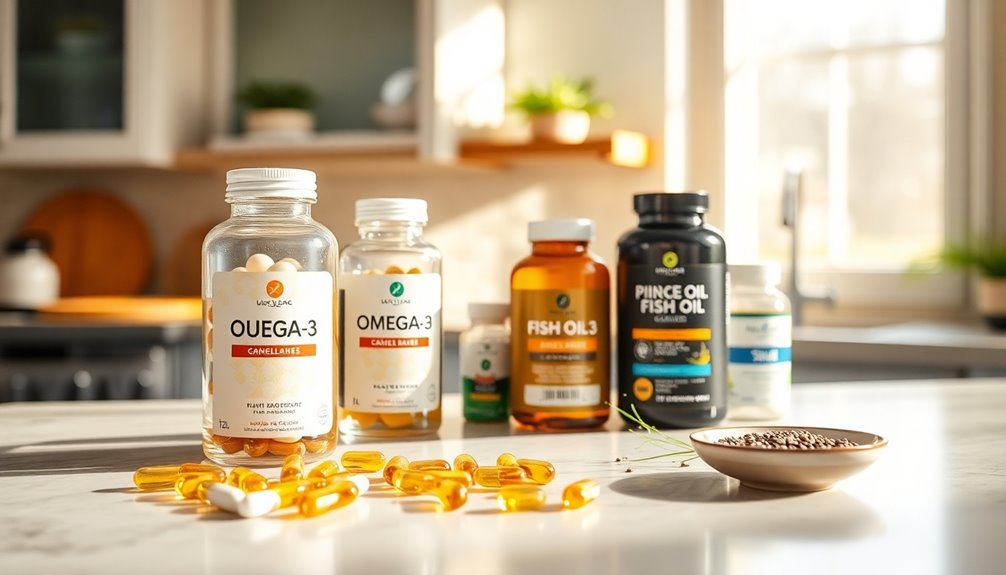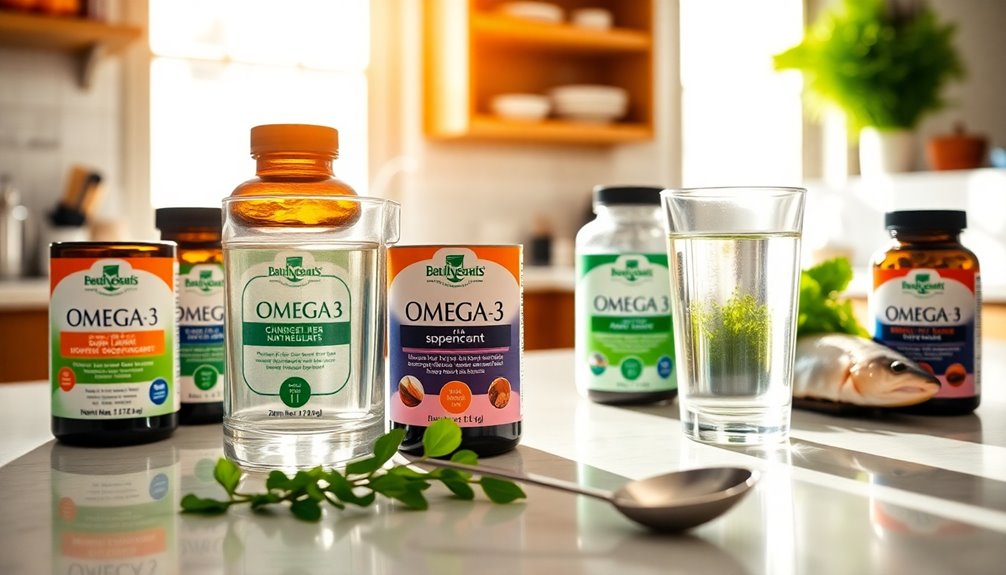To select the best omega-3 supplement, first consider the origin—fish oil, algae, or fortified foods. Look for EPA and DHA content, as these types offer the most health benefits. Aim for a daily intake of 250–500 mg, and consult your healthcare provider for personalized dosage based on your needs. Check for third-party testing to guarantee quality and purity, and choose between liquid or capsule forms based on your preference. Be mindful of potential side effects and select reputable brands. Exploring various angles can help you make an informed choice tailored to your health goals.
Key Takeaways
- Identify your health goals to determine whether you need EPA, DHA, or ALA and their specific benefits for your needs.
- Choose high-quality supplements that have undergone third-party testing for purity and sustainability to ensure safety and effectiveness.
- Consider your dietary preferences, such as vegan options like algae supplements, to align with your lifestyle and ethical values.
- Check the recommended dosage based on your health concerns and consult a healthcare professional for personalized guidance.
- Look for reputable brands with transparent sourcing and positive reviews to ensure you are getting a reliable product.
Understanding Omega-3 Fatty Acids

Omega-3 fatty acids play a significant role in maintaining overall health and well-being. These necessary fats are vital for various bodily functions, including brain health, heart health, and reducing inflammation. You might be wondering about the specific benefits of incorporating omega-3s into your diet. Research indicates that omega-3s can help lower the risk of chronic diseases, such as heart disease, and may even support mental health by reducing symptoms of depression and anxiety.
When it comes to sources of omega-3 fatty acids, you'll find them primarily in two forms: EPA (eicosapentaenoic acid) and DHA (docosahexaenoic acid), which are commonly found in fatty fish like salmon, mackerel, and sardines. ALA (alpha-linolenic acid), another type of omega-3, is found in plant-based sources like flaxseeds, chia seeds, and walnuts. It's crucial to include a variety of these sources in your diet to reap the full benefits. Additionally, incorporating whole-food sources of protein can enhance the overall nutritional value of your meals and support your health goals.
If you're not a fan of fish or have dietary restrictions, don't worry! You can still obtain omega-3s through fortified foods or plant-based supplements. Incorporating omega-3s into your life isn't just about improving your health; it's about belonging to a community that values wellness and vitality. By understanding the importance of omega-3 fatty acids, you're taking a proactive step toward a healthier lifestyle, embracing the benefits that come with it.
Sources of Omega-3 Supplements

When exploring sources of omega-3 supplements, you'll find a variety of options to suit different dietary preferences and needs. One of the most popular sources is fish oil, derived from fatty fish like salmon, mackerel, and sardines. Fish oil is rich in EPA and DHA, two key omega-3 fatty acids known for their numerous health benefits, including supporting heart health and reducing inflammation. If you're a seafood lover, fish oil might be a natural choice for you, as it provides a concentrated dose of these essential fats.
However, not everyone includes fish in their diet, whether due to allergies, dietary restrictions, or lifestyle choices. This is where algae supplements come into play. Algae, the original source of omega-3s in the marine food chain, offer a plant-based alternative that's suitable for vegans and vegetarians. Algae supplements typically contain DHA, and some brands also provide EPA, making them a viable option for those looking to boost their omega-3 intake without animal products. Additionally, it's important to consider that consumption of omega-3s can help mitigate some of the health risks of traditional bread consumption, particularly related to inflammation and overall metabolic health.
Ultimately, your choice between fish oil and algae supplements should align with your dietary preferences and ethical considerations. Whichever source you choose, make sure that the supplement is sourced from high-quality, sustainable practices to maximize benefits and minimize environmental impact. By understanding these sources, you can make an informed decision that fits your lifestyle while reaping the benefits of omega-3 fatty acids.
Types of Omega-3s

Understanding the types of omega-3 fatty acids is essential for selecting the right supplement for your health needs. Omega-3s primarily come in three forms, each with its unique benefits and sources. Here's a quick rundown:
- EPA (Eicosapentaenoic Acid): Found mainly in fish oil, EPA is known for its anti-inflammatory properties. It may help reduce symptoms of depression and support heart health.
- DHA (Docosahexaenoic Acid): Also prevalent in fish, DHA is vital for brain health. It plays a significant role in cognitive function and is crucial during pregnancy for fetal brain development.
- ALA (Alpha-Linolenic Acid): This plant-based omega-3 is found in flaxseeds, chia seeds, and walnuts. While ALA is advantageous, it's worth noting that your body converts it to EPA and DHA at a lower efficiency, making it less potent than its fish counterparts.
When examining EPA vs DHA, consider your specific health goals. If you're focusing on heart health, EPA may be your best option, while for brain function, DHA is indispensable. Additionally, plant vs fish sources matter too. If you follow a vegetarian or vegan lifestyle, ALA-rich supplements can still provide benefits, but you might want to explore algae-based supplements that offer DHA. The importance of choosing the right alternative solutions for health issues can significantly affect overall well-being.
Recommended Dosages

Determining the correct dosage of omega-3 supplements can greatly impact your health benefits. The dosage recommendations can vary considerably based on individual needs, health conditions, and dietary habits.
For general health, many experts suggest a daily intake of 250–500 mg of combined EPA and DHA, the two most beneficial omega-3 fatty acids. If you're looking to address specific health concerns, such as heart health or inflammation, higher dosage levels may be effective. For instance, some studies indicate that daily doses of 1,000–4,000 mg can provide enhanced benefits for those with certain conditions.
It's important to take into account your unique situation when determining your omega-3 needs. Factors like age, sex, and lifestyle can influence how much omega-3 your body requires. Pregnant or breastfeeding women often have different dosage recommendations, typically around 200–300 mg to support fetal development.
While higher dosages may seem appealing for increased effectiveness, it's important to consult a healthcare professional before significantly increasing your intake. They can help you navigate potential interactions with medications and make sure that your omega-3 intake aligns with your overall health goals. A well-balanced diet, rich in plant-based nutrients, can also complement your omega-3 supplementation and enhance overall health.
Ultimately, finding the right balance in your omega-3 supplementation can help you fully experience the myriad benefits these essential fats offer, from improved heart health to enhanced cognitive function. Remember, it's not just about taking any supplement; it's about choosing the right one for you.
Purity and Quality Standards

Your omega-3 supplement's purity and quality greatly influence its effectiveness and safety. To guarantee you're getting the best, it's important to look for specific indicators that reflect a product's integrity. Here are three key aspects to take into account:
- Third Party Testing: Reputable brands often submit their products to independent labs for testing. This process verifies that the supplement is free from harmful contaminants like heavy metals, PCBs, and other toxins. Look for certifications from organizations like the International Fish Oil Standards (IFOS) or the United States Pharmacopeia (USP).
- Certifications: Certifications can indicate a commitment to quality and safety. Check for labels from recognized authorities that ensure the product meets strict purity and quality standards. This not only provides peace of mind but also ensures you're investing in a reputable product.
- Sustainable Sourcing and Transparency: Knowing where your omega-3s come from is essential. Brands that prioritize sustainable sourcing are more likely to offer high-quality products. Transparency about sourcing practices is crucial; manufacturers should openly share information about their supply chain and fishing practices. Additionally, it is beneficial to choose supplements from brands that understand the effects of high blood pressure on overall health and wellness.
Form of Omega-3 Supplements

When selecting an omega-3 supplement, the form it comes in can greatly impact absorption and effectiveness. The two primary forms you'll encounter are liquid and capsules.
Liquid omega-3 supplements often provide higher bioavailability, meaning your body can absorb them more efficiently. If you don't mind the taste, a liquid form might be your best bet for maximizing benefits.
However, if you're looking for convenience and portability, capsules can be a better choice. They're easy to take on the go and can help mask any fishy aftertaste that some liquids may have.
Another important factor to take into account is whether you want a vegan option. Traditional omega-3 supplements are derived from fish oil, but several plant-based alternatives are available. Algal oil, extracted from algae, is a popular vegan source of DHA and EPA, the key components of omega-3s. These vegan options aren't only suitable for those avoiding animal products but can also be a great way to get your omega-3s without the potential contaminants found in some fish oils.
Ultimately, the best form of omega-3 supplement for you depends on your lifestyle and preferences. Following natural cycles of high and low calorie consumption can also support your overall health, making omega-3 supplementation even more effective. Whether you opt for liquid, capsules, or a vegan alternative, make sure you choose a product that meets your quality standards. By doing so, you'll be one step closer to supporting your overall health and well-being with omega-3s.
Targeted Health Benefits

Exploring the targeted health benefits of omega-3 supplements reveals their significant role in supporting various aspects of well-being. These essential fatty acids can provide support for a range of specific conditions, making them a valuable addition to your health routine. When considering omega-3 supplements, it's essential to look for personalized recommendations that align with your health goals.
Here are three targeted health benefits of omega-3 supplements:
- Heart Health: Omega-3s are well-known for their ability to support cardiovascular health. They can help lower triglyceride levels, reduce blood pressure, and decrease the risk of heart disease. Additionally, addressing oxidized cholesterol can further enhance cardiovascular protection.
- Brain Function: Research suggests that omega-3 fatty acids play a vital role in cognitive function. They may improve memory and mood, potentially benefiting those with anxiety or depression.
- Joint Health: Omega-3s possess anti-inflammatory properties, which can ease joint pain and stiffness, making them particularly advantageous for individuals with arthritis or other inflammatory conditions.
When selecting an omega-3 supplement, consider your unique health needs and consult with a healthcare professional for personalized recommendations. This approach ensures you're choosing a supplement that effectively targets your specific health conditions while contributing to your overall wellness journey. By understanding the targeted health benefits, you can make informed decisions that support your well-being, fostering a sense of belonging in your health community.
Potential Side Effects

While omega-3 supplements are celebrated for their numerous health benefits, it's important to be aware of potential side effects that may arise. You might find that some individuals experience mild gastrointestinal issues, such as bloating or diarrhea, especially when taking higher doses. To minimize these effects, consider starting with a lower dosage and gradually increasing it as your body adjusts.
Another key point is the interaction risks associated with omega-3 supplements. If you're taking blood thinners or have a bleeding disorder, omega-3s can potentially enhance the effects of these medications, increasing your risk of bleeding. Always consult your healthcare professional before adding any supplement to your routine, particularly if you're managing chronic health conditions. Additionally, natural supplements like NeuroPure may offer alternative support for nerve health, which could complement your overall wellness strategy.
Here's a quick overview of some common side effects and considerations:
| Side Effect | Details |
|---|---|
| Gastrointestinal Issues | Bloating, gas, or diarrhea may occur. |
| Fishy Aftertaste | Some may experience a lingering taste. |
| Allergic Reactions | Rare, but possible if allergic to fish. |
| Interaction Risks | Increased bleeding risk with blood thinners.
Tips for Choosing a Brand

Choosing the right omega-3 supplement can feel overwhelming, given the abundance of brands and formulations available. However, you can simplify your decision-making process by focusing on a few key factors. Here are three essential tips for choosing a brand that meets your needs:
- Check Brand Reputation: Look for brands that have a solid reputation in the market. Research customer reviews, expert endorsements, and any certifications like those from the International Fish Oil Standards (IFOS). A reputable brand often indicates a dedication to quality and transparency.
- Investigate Ingredient Sourcing: The source of omega-3s can greatly impact the product's quality. Brands that prioritize sustainable sourcing, such as wild-caught fish or algae, tend to offer higher-quality supplements. Ensure the brand provides information about where and how they source their ingredients.
- Review Testing and Transparency: Trustworthy brands will often have third-party testing for purity and potency. Check if the brand shares lab results or has certifications to prove their product's quality and safety. This transparency helps you feel confident in what you're consuming. Additionally, maintaining good gut health can further enhance the benefits of omega-3 supplementation.
Frequently Asked Questions
Can Children Take Omega-3 Supplements Safely?
Yes, children can take omega-3 supplements safely, but it's important to follow dosage recommendations based on their age and weight. Consult with a pediatrician to determine the appropriate amount for your child.
While omega-3s are generally well-tolerated, be mindful of possible side effects like gastrointestinal discomfort or allergic reactions. Staying informed helps you make the best choice for your child's health and guarantees they receive the benefits without unnecessary risks.
How Long Does It Take to See Benefits?
You might think you'll feel the effects of omega-3s overnight, but it's not that simple. Generally, you'll notice benefits in 4 to 12 weeks, depending on dosage effectiveness and your body's unique response.
While omega-3s can improve heart health and reduce inflammation, don't ignore potential side effects like digestive discomfort.
Are There Vegetarian Omega-3 Options Available?
Yes, there are vegetarian omega-3 options available! You can find supplements derived from plant-based sources like algae, which provide DHA and EPA.
While most plant sources, like flaxseed and chia seeds, primarily offer ALA, algae-based supplements can give you the essential DHA and EPA that are vital for heart and brain health.
Can Omega-3 Supplements Interact With Medications?
Yes, omega-3 supplements can interact with medications, leading to potential safety concerns. They may enhance the effects of blood thinners, increasing bleeding risks. If you're on medication, it's essential to consult your healthcare provider before starting any omega-3 supplement.
They can help you navigate any drug interactions, ensuring your health and safety are prioritized. Staying informed and working with your doctor helps you make the best choices for your well-being.
What Is the Best Time to Take Omega-3 Supplements?
The best time to take omega-3 supplements often depends on your routine. Taking them in the morning can energize you, while nighttime may promote relaxation. It's generally more effective to take omega-3s with food, as this enhances absorption. If you take them on an empty stomach, you might experience digestive discomfort.
Experimenting with both morning and night can help you find what works best for you, ensuring you get the most benefits from your supplement.
Conclusion
In the quest for peak health, choosing the right omega-3 supplement is like selecting the right tools for a craftsman; the right choice can enhance your well-being. By considering factors like source, type, and quality, you equip yourself to make informed decisions. Remember, just as a well-tuned instrument produces harmony, the right omega-3 can support your body's balance. Prioritize purity and tailored benefits, ensuring you find a supplement that resonates with your individual health needs.



